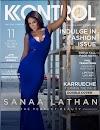 Over the weekend, Lauren at Fashionista, "took a break from the shows to chat with Wall Street Journal reporter Deborah Ball, the author of House of Versace: The Untold Story of Genius, Murder, and Survival, released February 2.
Over the weekend, Lauren at Fashionista, "took a break from the shows to chat with Wall Street Journal reporter Deborah Ball, the author of House of Versace: The Untold Story of Genius, Murder, and Survival, released February 2.She goes on with thee interview to say...
After watching the Versace runway rehearsal and the show from backstage, I was eager to meet Ball, who knows more about the inner-workings of the company than anyone, really.
Ball’s been a reporter at WSJ for quite a long time. From the late ’90s until just a couple of years ago, she covered luxury goods from Milan. (She’s currently based in Zurich and covers Switzerland’s major news.) The dramatic Versace story–Gianni’s death, Donatella’s drug addiction, Allegra’s struggle to deal with her inheritance through anorexia–always intrigued her, but it was virtually untouched by the general press as well as the fashion industry whilst it was happening.
First it was out of respect for brutally murdered Gianni. Then, there were bigger fish to fry. The late ’90s, early ’00s brought the battle for Gucci between PPR and LVMH, the rise of the accessory as the luxury industry’s cash cow and Prada’s much more public money problems.
But by 2007, Ball was ready to attack the story from all angles. And the Versace family was willing to work with her. The book covers everything from business troubles to personal problems, and Ball was able to talk with nearly everyone involved, save for Donatella’s daughter–and main shareholder in the company–Allegra.
It’s no secret that Versace has struggled since Gianni’s death in 1997. Ball says that, at that time, Versace was about the same size as other family-owned companies like Giorgio Armani and Gucci, with $550 million in sales that year. In 1998, the Versace company was valued by investors at $1.6 to $2 billion.
Fast forward a decade. Armani’s sales were $2.38 billion globally in 2008. Gucci’s sales reached $3 billion in 2009. Versace’s sales, on the other hand, were $380 million in 2009, a 20% decrease from 2008.
Will Versace, with its positive runway reviews and plentiful advertising, ever reach its money-making potential?
“Not as long as it’s owned by the family,” says Ball.
In order for a luxury goods maker to grow, it needs plenty of outside investors, as well as an easy way to make money. The family-owned Hermes, for example, is able to remain successful because it relies partially on outside investments. What’s more, its biggest source of sales–leather goods–boasts a tremendous markup that results in bigger profits. Chanel has handbags, makeup and perfume. And Armani, which is continuously courted by investors, uses the multi-channel approach, offering goods of different kinds–housewares, men’s wear, women’s wear– at nearly every possible price point.
“Versace is a niche brand with a massive image,” says Ball. While the company may have its image under control, the bottom line has a long way to go.





0 Yorumlar